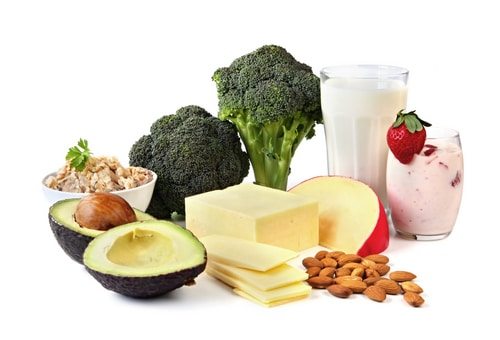 Calcium is an essential mineral not only for healthy bones but for proper nerve and heart function. In addition, calcium plays a critical role in muscle contraction. That’s important whether you’re doing a high-intensity workout or simply walking down the street. Unfortunately, most people don’t get enough calcium in their diet. The safety of calcium supplements is being questioned after research showed an increased risk of heart attack among people taking calcium supplements. That’s why the best way to get calcium is naturally through diet. Unfortunately, not all the calcium that enters your mouth is absorbed by your intestines. Calcium absorption is affected by a number of factors and you may not be getting all of the benefits of the calcium you take in.
Calcium is an essential mineral not only for healthy bones but for proper nerve and heart function. In addition, calcium plays a critical role in muscle contraction. That’s important whether you’re doing a high-intensity workout or simply walking down the street. Unfortunately, most people don’t get enough calcium in their diet. The safety of calcium supplements is being questioned after research showed an increased risk of heart attack among people taking calcium supplements. That’s why the best way to get calcium is naturally through diet. Unfortunately, not all the calcium that enters your mouth is absorbed by your intestines. Calcium absorption is affected by a number of factors and you may not be getting all of the benefits of the calcium you take in.
Calcium Absorption: Are You Absorbing All of the Calcium in Your Diet?
If you eat dairy foods, you’re getting an excellent source of calcium, but if you don’t eat dairy, you can still get this essential mineral from plant-based sources like green, leafy vegetables, Bok Choy, sunflower seeds, almonds, broccoli and soybeans, fortified oatmeal, fortified orange juice, among others. On the other hand, it’s not how much calcium you take in that counts – it’s how much you absorb. Here are some ways to maximize the amount of calcium you absorb from your diet.
Get Enough Vitamin D
Your body needs vitamin D for calcium absorption – and the best source of vitamin D is sun exposure. The sun’s rays convert a compound on your skin to a vitamin D precursor that can be processed by your liver and kidneys to form active vitamin D. Most foods are not naturally high in vitamin D, although some foods, such as milk, are fortified with it. Natural sources of vitamin D include fatty fish, liver and egg yolks. If you live in an area without a lot of direct sunlight or cover your skin with a sunscreen year round, ask your doctor to check a vitamin D level. If it’s low, you may need to take a vitamin D supplement to enhance calcium absorption and protect the health of your bones.
Are You Getting Enough Vitamin C?
Vitamin C also increases dietary calcium absorption. Make sure you’re getting enough of this antioxidant vitamin that’s so vital for healthy skin and joints and good immune function. Contrary to popular belief, citrus fruit isn’t the only source of Vitamin C. Other good sources are bell peppers, strawberries, broccoli, kiwifruit, papaya, and kale. If you consume a vitamin C-rich food along with calcium, you’ll maximize the amount of calcium your body can use. Calcium-fortified orange juice is beneficial because it’s a good source of both calcium and vitamin C.
Watch Out for Food Ingredients That Reduce Calcium Absorption
Some foods contain oxalates, phytic acid or tannins, compounds that reduce the absorption of calcium. Fruits, vegetables, whole grains, beans, tea, coffee, and chocolate usually contain at least one of these components. Even a high-fiber diet, a good thing when it comes to heart health, reduces calcium absorption. If you eat lots of fruits, vegetables, and whole grains or drink tea and coffee, you may need to compensate by adding more calcium to your diet.
Having Enough Stomach Acid is Important Too
Another factor that affects calcium absorption is stomach acid. The acid in your stomach dissolves calcium so it can be better absorbed when it reaches your intestines. The amount of acid your stomach produces goes down with age – and that affects calcium absorption. Plus, people who take medications that block acid production to treat conditions like acid reflux are at greater risk for calcium deficiency. If you take one of these medications, talk to your doctor.
Get Calcium in Small Doses throughout the Day
You’ll absorb more calcium if you get it in smaller amounts throughout the day instead of one big, calcium-rich meal. Eat calcium-rich food several times a day to maximize the amount of calcium your body can absorb.
The Bottom Line?
Just because you’re eating a calcium-rich diet doesn’t necessarily mean you’re getting the benefits. To maximize calcium absorption, keep these factors in mind when planning your diet.
References:
J. Nutr. November 1, 2004 vol. 134 no. 11 3137-3139.
Zeitschrift für Ernährungswissenschaft. Volume 15, Number 4 (1976), 387-390, DOI: 10.1007/BF02020506.
American Journal of Medicine (2005;118: 778–81.
Related Articles By Cathe:
Calcium Absorption: How Much Calcium Are You Actually Absorbing from the Food You Eat?
5 Factors That Affect Nutrient Absorption From Your Diet
Calcium, Dairy Foods, and Belly Fat
Calcium Absorption and Health: Why You Don’t Want to Sip Tea While You’re Eating Yogurt

